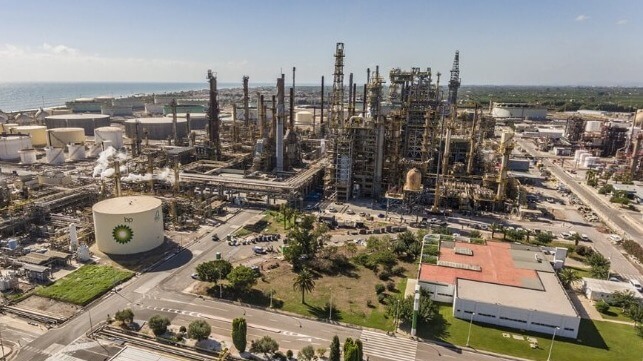BP and Iberdrola Partner for Hydrogen, Ammonia and Methanol Production

Energy majors BP and Iberdrola announced plans to form a new joint venture designed to help in the acceleration of decarbonization of transport and industrial sectors. Together, the companies intend to collaborate to develop large-scale green hydrogen production that could be used in the maritime and other industries as well as efforts to significantly expand the fast EV public charging infrastructure to support the adoption of electric vehicles.
“Creating the lower carbon energy solutions that our customers want and need requires the integration of different technologies, capabilities, and forms of energy,” said Bernard Looney, CEO of BP announcing the plans for the joint venture. “We can deliver this faster and at scale when we work in partnership with others.”
The companies plan to form a joint venture for large-scale integrated green hydrogen production in Spain, Portugal, and the UK, as well as production of derivatives such as green ammonia, and methanol, that could potentially be exported into Northern Europe. Demand, especially for ammonia and methanol, is expected to grow rapidly in the next few years, especially from the maritime sector as both are considered leading candidates to speed the decarbonization of shipping.
Leading carriers including Maersk and CMA CGM have announced plans to build methanol-fueled ships while also expressing concerns that the supply of the fuel will not support the shipping industry’s near-term initiatives. Methanol is especially attractive as the technology exists today to operate ships on the fuel while ammonia-fueled engines continue to be developed.
According to BP and Iberdrola, the strategic collaboration will combine the Spanish energy company’s experience in renewables development and its global customer base. BP has extensive experience in gas processing, trading, and a global customer portfolio.
The companies aim to jointly develop advantaged hydrogen production hubs in Spain, Portugal, and the UK. They are targeting a total capacity of up to 600ktpa, integrated with new renewable power.
The green hydrogen project at BP’s Castellón refinery will be part of the agreement. Iberdrola and BP have also agreed that industrial hydrogen projects under development, as well as new projects, will be part of the agreement. The two companies, together with the Instituto Tecnológico de la Energía, have submitted the Castellón project to the Spanish government's hydrogen value chain PERTE call, while they intend to explore potential future opportunities for green hydrogen production in geographies beyond Spain, Portugal, and the UK.
“With this agreement, we continue advancing in the decarbonization and energy self-sufficiency through the electrification of two key sectors of our economy, transport, and industry,” said Ignacio Galán, chairman of Iberdrola. “The scale of this challenge requires alliances between companies such as Iberdrola and bp, which have the technology and knowledge necessary to help accelerate Europe's industrial development and generate, at the same time, new opportunities for all through clean energy.”

that matters most
Get the latest maritime news delivered to your inbox daily.
In addition to the initiatives to produce alternative fuels, the companies intend to invest up to €1 billion to roll out a network of up to 11,000 rapid and ultra-fast EV public charge points across Spain and Portugal. The plan includes installing and operating an initial 5,000 fast charge points by 2025, and up to a total of 11,000 by 2030, including bp and Iberdrola’s existing and future fast charging hubs. According to the companies, this will significantly expand access to charging for consumer and fleet customers thus accelerating electric mobility.
BP and Iberdrola aim to finalize both joint venture agreements by the end of 2022, subject to regulatory approvals.
